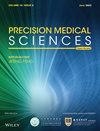Application of evidence‐based nursing in postoperative radiotherapy care for breast cancer
IF 0.6
Q4 MEDICINE, RESEARCH & EXPERIMENTAL
引用次数: 0
Abstract
To investigate the effect of evidence‐based nursing on breast cancer patients during postoperative radiotherapy care. In the sample selection, 100 breast cancer patients who received postoperative radiotherapy in our hospital from January 2020 to January 2022 were selected to participate in this study. Patients in the control group received routine nursing program, while patients in the study group applied the intervention of evidence‐based nursing philosophy, the nursing effect was compared between the two groups. According to the nursing effect of the two groups, there was a significant difference under the intervention of different protocols. The patients in the study group showed significant improvements in Self‐Rating Depression Scale and Self‐Rating Anxiety Scale scores under the evidence‐based care intervention, superior to those of the control group, and the difference was significant (p < .05); from the scores of shoulder and elbow functions, the patients in the study group showed more significant intervention effects, superior to that of the control group, and the difference was significant (p < .05); from the skin injury degree of the two groups, the skin injury grade of the study group was significantly superior to that of the control group, with a significant difference (p < .05); from the patient satisfaction indexes, after the evidence‐based nursing intervention, the satisfaction indexes of the study group and the control group were 98% and 82%, respectively, and the difference was significant (p < .05). In the current nursing intervention of postoperative radiotherapy for breast cancer patients, evidence‐based nursing models can effectively relieve the adverse emotions of patients, improve patients' shoulder joint and elbow joint function, reduce the skin damage, and improve patient satisfaction, which has an important clinical spread value.循证护理在癌症术后放疗中的应用
探讨循证护理对癌症患者术后放疗的影响。在样本选择中,选择2020年1月至2022年1月在我院接受术后放疗的100名癌症患者参与本研究。对照组患者采用常规护理方案,研究组患者采用循证护理理念干预,比较两组患者的护理效果。根据两组的护理效果,在不同方案的干预下有显著差异。在循证护理干预下,研究组患者的抑郁自评量表和焦虑自评量量表得分显著改善,优于对照组,差异有统计学意义(p < .05);从肩肘功能评分来看,研究组患者的干预效果更为显著,优于对照组,差异有统计学意义(p < .05);从两组皮肤损伤程度来看,研究组的皮肤损伤程度明显优于对照组,差异有统计学意义(p < .05);从患者满意度指标来看,循证护理干预后,研究组和对照组的满意度指标分别为98%和82%,差异有统计学意义(p < .05)。在目前癌症患者术后放疗的护理干预中,循证护理模式能有效缓解患者不良情绪,改善患者肩关节和肘关节功能,减少皮肤损伤,提高患者满意度,具有重要的临床推广价值。
本文章由计算机程序翻译,如有差异,请以英文原文为准。
求助全文
约1分钟内获得全文
求助全文

 求助内容:
求助内容: 应助结果提醒方式:
应助结果提醒方式:


